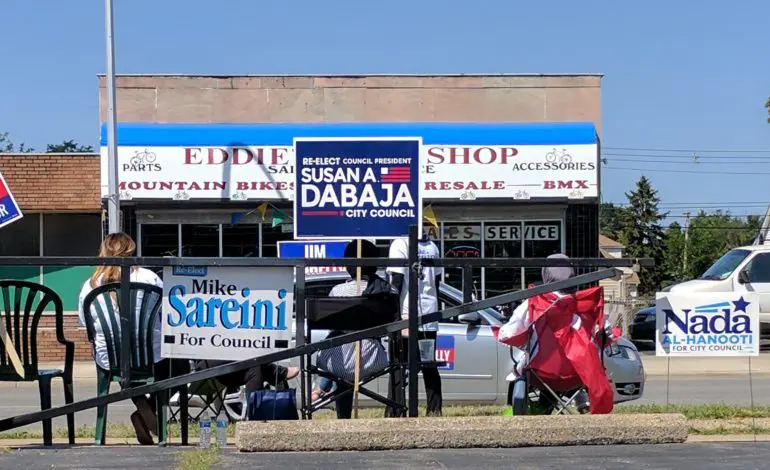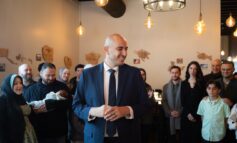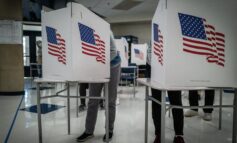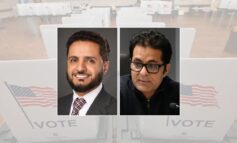DEARBORN – Since it was established in 1927, Dearborn has become recognized as a model city where families enjoy top-notch public schools, safety, city services and national landmarks.
Unified on maintaining that level of city services, residents have taken a particular interest in their municipal elections throughout the decades, Sami Khaldi, president of the Dearborn Democratic Club, told The AANews.
But a massive immigration influx, coupled with the city’s first contested mayoral race in more than decade, has the city’s new demographic itching for change.
Almost 80 years after Ford factory workers established a community, Arab Americans have gained political leverage and investment power beyond the city.
“Now the ball is in our court to fulfill our responsibility,” Khaldi said.
Vying for representation
About half of Dearborn’s population are Arab Americans, according to the 2010 U.S. Census, yet a list of employees obtained by The AANews shows only about 8 percent of them work full time in city government.
Many are betting on the Nov. 7 general elections to change that.
“We haven’t seen this movement that our community is involved in so heavily,” Khaldi said. “Local elections are so important to us because it affects our daily lives.”
At the Arab American Political Action Committee’s 20th anniversary dinner, Dearborn resident Abraham Baiz told The AANews that equal representation in government is what’s driving him to the polls.
“I’m part of the younger, new generation that wants to go out and prove that we’re not like our fathers that came from overseas and were not involved in what’s going on in the city,” he said. “I do want the city to represent us, and the way I can do that is by voting.”
Although the City Council will see some new faces, most residents are enthusiastic about the mayoral race between incumbent Mayor Jack O’Reilly and long-time Councilman Tom Tafelski.
O’Reilly has touted already articulated plans throughout his campaign that address the issues, and Tafelski seeks to change the city government’s direction.
Pointing at a standing-room-only hall at the annual AAPAC dinner, Nov. 1, Baiz questioned whether the low number of city employees was due to a lack of political engagement.
“There’s plenty of that,” he said. “We want the city to give us a change, to be represented.”
The Aug. 8 primary elections saw an influx in Arab American candidates on the ballot, most whose names were new to residents, but the results turned out to be unfavorable for most. The five City Council candidates to receive the fewest votes were Arab Americans.
Mohsin Hubaishi, president of the Yemeni American Benevolent Association, told The AANews that many voters felt their vote was diluted because the ballot was overcrowded with Arab American candidates, many of whom lacked a strategy.
He added that some candidates relied on voters’ loyalty through ties to family or country of origin.
“Conflicts [within the community] affected our unity and churned some divisions between social and religious groups,” Hubaishi said.
The race to unify Dearborn
Baiz said he recently married and moved to the west end of Dearborn, due to apparent disparities in infrastructure and city maintenance between the east and west.
“Growing up in the east, moving to the west-side means you ‘made it,’” he said. “We want a candidate who will bring out the city’s potential on both sides.”
Where Baiz now resides, a statue serves as a daily reminder of a dark history.
Residents, business owners and college students have showed up to Historical Commission meetings and demonstrated in recent months, demanding the removal of former Mayor Orville Hubbard’s statue from the Dearborn Historical Museum’s lawn.
Hubbard, a self-proclaimed segregationist, was mayor of Dearborn for 15 terms from 1942 to 1978.
The statue was originally placed in front of the former Dearborn City Hall in 1989, but was removed and placed in storage after the City Hall building was sold in 2015. It was quietly erected again in April on the museum’s front yard and later moved to the side yard.
The statue reflects that sentiments and policies that favor Whiter communities are still alive today, Baiz said.
Hubaishi said local Yemenis feel undervalued by elected officials who’ve forgotten about them after entering office.
In the city’s Southend, where most Yemeni Americans live, that’s had repercussions on their infrastructure, so many will be voting with caution, he said.
“The Southend of Dearborn is different from the city of Dearborn,” Hubaishi said. “It need more help, more development, projects, more police security.”
For years, Ford factories’ over-pollution have caused controversy, but the company does nothing in return for the community, he added.
He urged city officials to build housing projects and implement educational programs for newcomers with little money or education.
“Because of the civil war in Yemen, we have thousands of Yemenis immigrating to a district that has no projects,” Hubaishi said. “Some people are looking all over to find place to love or lease. Now they’re tying to expand to some other areas, because they can’t find a place.”
Who’s on the ballot
A heated mayoral race is brewing between Mayor O’Reilly and Councilman Tafelski.
City Council President Susan Dabaja and Councilman Michael Sareini are on the ballot, along with fellow incumbents Robert A. Abraham, Brian O’Donnell and David Bazzy, as well as newcomers Nada Al-Hanooti, Fayrouz Bazzi, Erin Byrnes, Sharon Dulmage, Regan Ford, Sean Green, Ramez Haidar, Leslie Herrick and Kenneth Paris.
In the race for city clerk, George Darany faces off against Nofila Haidar.






Leave a Reply